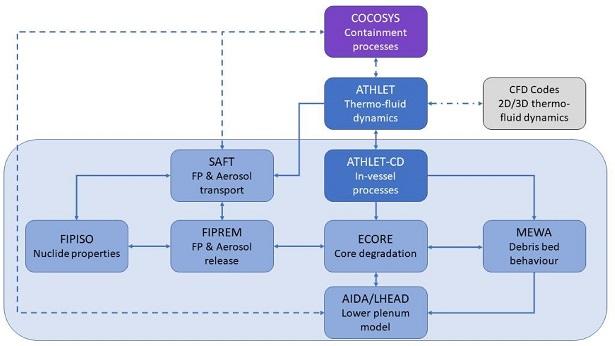The system code ATHLET-CD (Analysis of THermal-hydraulics of LEaks and Transients with Core Degradation) is designed to describe the reactor coolant system thermal-hydraulic response during severe accidents, including core damage progression, as well as fission product and aerosol behaviour, to calculate the source term for containment analyses, and to evaluate accident management measures. It is being developed by GRS in cooperation with the Institut für Kernenergetik und Energiesysteme (IKE), University of Stuttgart.
The ATHLET-CD structure is highly modular in order to include a manifold spectrum of models and to offer an optimum basis for further development. ATHLET-CD contains the original ATHLET models for comprehensive simulation of the thermo-fluid-dynamics in the primary circuit. The ATHLET code comprises a thermo-fluid-dynamic module, a heat transfer and heat conduction module, a neutron kinetics module, a general control simulation module, and a general-purpose solver of differential equation systems called FEBE. The thermo-fluid-dynamic module is based on a six-equation model, with fully separated balance equations for liquid and vapour, complemented by mass conservation equations for up to 5 different non-condensable gases and by a boron tracking model. Specific models for pumps, valves, separators, mixture level tracking, critical flow etc. are also included in ATHLET.

The rod module ECORE consists of models for fuel rods, absorber rods (AIC and B4C) and for the fuel assemblies including BWR canisters and absorbers. The module describes the mechanical rod behaviour (ballooning), zirconium and boron carbide oxidation (Arrhenius-type rate equations), Zr-UO2 dissolution as well as melting of metallic and ceramic components. The melt relocation (candling model) is simulated by rivulets with constant velocity and cross section, starting from the node of rod failure. The model allows oxidation, freezing, re-melting, re-freezing and melt accumulation due to blockage formation. The feedback to the thermal-hydraulics considers steam starvation and blockage formation. Besides the convective heat transfer, energy can also be exchanged by radiation between fuel rods and to surrounding core structures.
The release of fission products is modelled by rate equations within the module FIPREM, mostly based on temperature functions taking into account the partial pressure of the material gases. The transport of these fission products and aerosols within the cooling circuit is calculated by a module based on the code SOPHAEROS, which is developed by the French Institute IRSN.
The nuclide inventories are calculated by a pre-processor (OREST) as a function of power history, fuel enrichment and initial reactor conditions. The release and the transport of nuclides consider decay heat (α, β, γ) and further decay by means of mother-daughter chains calculated within the module FIPISO.
For the simulation of debris beds a specific model MEWA is under development with its own thermal-hydraulic equation system, coupled to the ATHLET thermo-fluid-dynamics on the outer boundaries of the debris bed. The transition of the simulation of the core zones from ECORE to MEWA depends on the degree of degradation in the zone. The code development comprises also late phase models for core slumping, melt pool behaviour within the vessel lower head (AIDA and LHEAD) as well as for vessel failure.
The code system ATHLET/ATHLET-CD is coupled to the containment code system COCOSYS, and it is the main process model within the German nuclear plant analyzer ATLAS. The ATLAS environment allows not only a graphical visualisation of the calculated results but also an interactive control of data processing.
The code validation is based on integral tests and separate effect tests, proposed by the CSNI validation matrices, and covers thermal-hydraulics, bundle degradation as well as release and transport of fission products and aerosols.
The development and validation of AC²/ATHLET-CD are supported by the German Federal Ministry for the Environment, Climate Action, Nature Conservation and Nuclear Safety (BMUKN).
